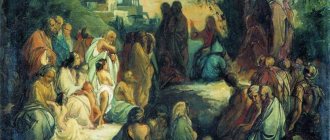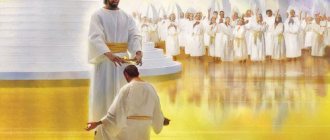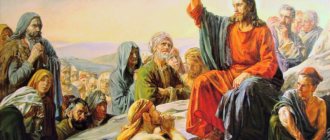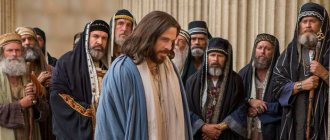Sermon on the Mount. Beatitudes (Matthew 5:2-12)
Estimated reading time: 8 minutes.
Having called the first disciples, Christ preaches in the Galilean synagogues, teaching and healing. People flock to Him; more and more people accompany Him on the journey, and not only Galileans, but also people from the Decapolis (Decapolis, a group of cities east of the Jordan), Jerusalem, Judea and Transjordan.
And so Jesus went up the mountain and sat on the top. The students settled around, and the people - on the slopes.
And for the first time the words sounded, later called the Sermon on the Mount. They are well known to us, but for the convenience of readers they should be cited here.
Sermon on the Mount. Carl Bloch, 1890.
Blessed are the poor in spirit, for theirs is the Kingdom of Heaven.
Blessed are those who mourn, for they will be comforted. Blessed are the meek, for they will inherit the earth. Blessed are those who hunger and thirst for righteousness, for they will be satisfied. Blessed are the merciful, for they will receive mercy. Blessed are the pure in heart, for they will see God. Blessed are the peacemakers, for they will be called sons of God. Blessed are those who are persecuted for the sake of righteousness, for theirs is the kingdom of heaven. Blessed are you when they revile you and persecute you and slander you in every way unjustly because of Me. Rejoice and be glad, for great is your reward in heaven: just as they persecuted the prophets who were before you.
This text (with the exception of the last half-phrase about the prophets) is sung in Church Slavonic at the Liturgy as the third antiphon, that is, the third of the choirs sung alternately in the choirs.
Thus, these are very, very familiar words. But, unfortunately, with frequent and not very careful repetition, the meaning does not become clearer, but, on the contrary, becomes foggy. So let’s return to it, especially since there are a sea of existing interpretations. It is proposed to choose the most uniform ones from them and, to begin with, agree that all these commandments do not apply to different people: everyone who hears them is called to apply everything to themselves. Christ does not divide His own into a dozen categories, but asks that each of us strive to be just like this, combining all these qualities.
Now let's see which ones exactly.
So much has been written and said about the poor in spirit... How many supporters the ideas of material poverty and unreasonableness have received... But it is said very clearly, and the easiest way to understand this is just as clearly: there is no need to be proud of your spiritual perfection, because everything that we have is This part is given to us by God by His grace, that is, in the literal sense of the word, as alms to the poor. Therefore, thoughts and conversations about the degree of “churching”, about spiritual “experience”, about the fact that, “maybe, father, I can guide my husband, otherwise he is so unspiritual...” are invalid. The worthlessness of such proud constructions is best revealed by an old good-natured anecdote about a girl who says in confession: “Father, I have reached the third stage of spiritual perfection according to John the Climacus.” And the priest answers: “Get married.” Married Get married." And that's all.
Of course, only the poor in spirit can enter the Kingdom of Heaven. There is no place for the proud there.
About those who cry. What is meant, of course, is not capricious people with frayed nerves, but those who mourn their imperfections and human misfortunes. A good example is the Monk David of Gareji (VI century), a Georgian monk who once prayerfully thought about the torment of women in childbirth and illness and cried out of compassion. From his tears a spring emerged, the water of which still helps sick and infertile women. And they pray to him for a successful birth and healing.
In order to cry tears of compassion, you need to have a kind, soft heart. In the eyes of Christ, this was the most important characteristic of a person. Reproaching for insufficient understanding of spiritual truths, He spoke about petrified hearts, and not at all about a lack of intelligence. And how can those who cry be consoled? - only by healing those things about which they cry: illnesses, misfortunes, injustice... Their tears go to God, and He will console them.
How do we understand that “the meek will inherit the earth”? And this is how to understand it. Meek means not aggressive. If you think about it, where are they, the warlike peoples of antiquity? Yes, they won, of course, flooding the earth with their own and others’ blood. And then they disappeared, and she moved on to others. This does not mean that the meek cannot fight. They can, but not like wild animals. Think about it and think about it.
These are absolutely wonderful words - about those who hunger and thirst for righteousness and who will be satisfied. Well, a person cannot live without the truth! It can exist, but not as a person, but as a protein body. And in order to support human life, we need not only proteins, fats and carbohydrates, but also truth; without it, it’s like without food and water: hunger and thirst overcome. And there is no need to argue that it would be good to skillfully prepare the truth, otherwise they won’t understand, the people are stupid, weak... The truth is needed as it is: God’s. There is no truth outside of Him, but there are attempts to reduce man to material and even purely physiological needs, declaring them to be the essence of life. Lies. You can cynically proclaim that “in reality” everyone lies, cheats, hides vile and selfish desires behind different words - and you yourself can live like this, and not believe in goodness, honesty and nobility. In fact, this is a direct path to death. Unfortunately, those who have chosen this path are trying to drag as many people along with them as possible. The mafia principle is the basis for the functioning of evil in a fallen world.
A lie does not satiate, it only creates the impression that nothing else is needed, because it is difficult to digest. It's like eating sawdust. But they are saturated with the truth, and joyfully feel its fullness and the fact that it gives strength to live, act and continue to move towards new comprehensions of it.
The merciful will receive mercy. The ancient “golden rule” is succinctly conveyed: do unto others as you would have them do unto you. In the twentieth century, one nun called this “the mutual guarantee of goodness.” The remarkable thing is that God is included in this circle, and the merciful receive mercy not only from the people to whom they showed mercy, but also from Him, who later said that the one who helps a person thereby helps Him. Christianity is an amazing teaching: the Lord always strives to be with us and expects a response from us.
The pure in heart will see God. What darkens and pollutes the heart? Malice, envy, lies, greed, dirty lust, indifference... well, and something else like that. In a word, vices. But how can you cleanse your heart from them? A well-known thing is fasting and prayer. Fasting is a good means for vigor, and prayer should be very specific and clearly addressed to the Creator and Savior.
There is one detail here: purity of heart is not necessarily piety. There is a wonderful story by Metropolitan Anthony of Sourozh about how he was an unbelieving teenager, but honestly and sincerely strove for the truth. He didn’t like the sermon he heard and decided to read the Gospel and “see for himself,” and depending on the result, abandon forever either thoughts about faith or his prejudice. I took the Gospel of Mark as the shortest one, began to read - and after a while I felt that “on the other side of the table, here, stands Christ...”. And he retained this involvement throughout his long life.
But there is one thing without which purity of heart is unattainable, and this is repentance. Therefore, it is in the penitential 50th Psalm that the prayer request is contained:
“Create in me a pure heart, O God, and renew a right spirit in my womb.”
Peacemakers will be called sons of God. It is clear that peace in the soul and on earth is a treasure to be strived for. And to be declared sons of God is a great reward. According to God's plan, people were created precisely in this capacity, and having sinned, they lost their sonship with God, one might even say, they voluntarily renounced it and became slaves. This is the lot of fallen man in a fallen world: at best to be a slave of God, at worst to be a slave of sin. Revelation gives humanity a new chance, because the Lord, generous and merciful and long-suffering, again calls him to Himself, adopts him anew, so long as man inherits love and peacefulness from his Heavenly Father.
Those who are persecuted for the sake of righteousness will enter the Kingdom of Heaven. It is not difficult to expel a person from his earthly fatherland, but the fate of an exile is bitter. Akhmatova wrote about her: “Your road is dark, wanderer, someone else’s bread smells like wormwood.” But if he is expelled for the truth of God and thereby unjustly, then another inheritance awaits him: the Kingdom of our Heavenly Father. Just don’t be cunning in this matter: consider the one who chose the best conditions an exile. Of course, he is within his rights; Of course, there is a degree of coercion. The difference is in the nuances... By the way, expulsion for the truth is not only expulsion from the country, but also dismissal because of faith (faith! and not because of neglect of one’s work duties, as, alas, happens).
The last of the “beatitudes” concerns those who endure reproach, persecution (and we know that there have been deadly persecutions in history, both ancient and recent) and unrighteous slander - for Christ. But that’s exactly what He is. This does not mean that if you were cursed in a store or in an office, then you are already a passion-bearer. Or if they falsely accused you because of your unusual hairstyle. Yes, the unjustly offended needs compassion (I find it very suspicious when they shout to the victim almost at gunpoint: “Humble yourself!” - it would be better if the offenders were humbled), he can become a righteous person only if he overcomes the offense in a Christian way. But we must always remember the lines of the Apocalypse, where we are talking about 144 thousand righteous (the number is a symbol of completeness, a thousandfold square of 12), who found shelter under the Throne of God and dressed in white robes.
At last there is a call to joy and gladness in anticipation of great reward in heaven. And here you should think: what’s on earth? Complete grief and despondency? This is unlikely, because the very fulfillment of these commandments carries a reward here and now. Of course, it is incomparable with heavenly bliss, but it prepares it, because one who does not love people (and this in itself is joy) will not be able to love God, and one who has not known joy - how can he learn it? ?
Another thing is that our life is full of trials, and we constantly have to make a choice between good and evil. This choice is difficult, because by choosing good, we risk exposing ourselves to very big troubles. But this choice itself also brings joy: the feeling that I am with the Lord, and He is with me. The wonderful Christian writer Heinrich Böll, in his novel “Billiards at Half Past Nine,” perhaps the best novel of the twentieth century, called it a choice between the sacrament of the lamb and the sacrament of the buffalo. The sacrament of the lamb means choosing the path of Christ, the communion of the buffalo means joining the brute and evil force. And no one will make this choice for us.
“With our God we will climb the wall,” says the Psalter. And without any karate.
History of appearance
The Savior proclaimed his commandments while wandering through Galilee, around 30 AD. In what Jesus said on the mountain, some researchers see an analogy with the ascent of Moses to Sinai. Thus, Christ acts as a follower, continuator of the work of the Old Testament prophet
Event location
The mountain where the teaching was delivered was called the “Mountain of Beatitudes.” Although there are no mountains in this part of Galilee, there are several large hills to the west of Lake Galilee. Some Gospel scholars believe that a more accurate translation from the Greek is “high place” rather than simply “mountain.”
There is also a version according to which Jesus Christ delivered his speech in a cave on a hill, where he performed a miracle with bread and fish, not far from Capernaum.
Preacher and listeners
Interestingly, according to the Gospel of Matthew, Jesus preaches his sermon while sitting. This may mean that the target audience for the Discourse on the Mount was not the entire Israeli people: teachers in synagogues always sat teaching doctrine. Thus, the evangelist emphasizes that the disciples and apostles were the main listeners of Christ.
This theory is confirmed in works of art - in paintings and icons, those close to him sit next to Jesus, and ordinary people are at a distance, although they can hear what is being said.
It is believed that the speech was addressed to three types of listeners: those close to them, the people and all of humanity, which is why it was recorded.
The commandments of Christ: two rewards - earthly and heavenly
“No one can serve two masters: for either he will hate one and love the other; or he will be zealous for one and neglectful of the other. You cannot serve God and mammon" From the Sermon on the Mount of Jesus Christ
The superconsciousness of today's society asks one thing from a person: to strive to become happy during life. The elements of such happiness are simple:
- Financial wealth (usually this means a successful career),
- Ability to look good
- Stay on top of the latest events and trends,
- Be aware of your rights and defend them,
- To be happy from the point of view: “get everything from life.”
These theses have deeply penetrated our civilization, becoming an entire system of beliefs by which millions of people live. But in the end it turns out that the pursuit of happiness and success makes a person unhappy - constantly constrained and internally lonely. And he seeks relaxation and completeness in oblivion: fun and alcohol.
This is not moralizing - these are spiritual laws, which Christ also spoke about during the Sermon on the Mount.
A person faces two realities, visible and invisible. The visible is the earthly world with all its aspirations - bright and tempting to the senses. At first glance, earthly happiness is spectacular and convincing, but in the end it is finite and does not give a person completeness, but only new and new aspirations based on the same earthly conventions.
The invisible reality is spiritual life for the sake of gaining Eternal life. Perhaps this reality is not so bright at first glance, but in fact it gives inner strength for the true fullness and beauty of life.
The human spirit is not able to bifurcate between two realities. Therefore, the desire for the riches of the visible world detracts from spiritual strength. With the departure of spiritual forces, emptiness sets in.
see also: Loneliness in the city: why does it occur?
This does not mean that you need to deny social life and lead a deliberately poor life. This only means that a person can have only one God. And the presence of many small gods (brands, idols) violates human harmony and turns a person into a mortal being.
Things are just things, and idols are just people. A person becomes whole and truly happy only when his whole heart and the strength of his spirit are directed towards Eternal Life and Christ. And then the whole value system changes, and life becomes simpler and, in fact, much more complete.
This is the brief essence of the Sermon on the Mount and the New Testament commandments. It is better to read the Sermon on the Mount in its entirety , and below we will give some quotes from it.
The commandments of Jesus Christ: the basis of any action is love (and meekness)
Love can be different. In the human understanding, love is accompanied by feelings, instincts or illusions.
- Mother's love for child.
- The love of a husband for his wife.
- Love for a pet or work.
Saints call this love non-absolute because such love is characterized by anger, bitterness and disappointment. Human love is a wonderful manifestation, but it is not absolute.
In the Sermon on the Mount and the New Testament commandments, Christ spoke about Divine Love. This Love is not a direction of feelings, but a state of soul and spirit. She is gentle love. Love that is not disturbed by any earthly disturbances.
Jesus Christ suggested not to fight the real cruel life, but to rise above it - with the help of meekness. Meekness does not mean oppressed downtroddenness - an oppressed downtrodden person does not have meekness. Meekness is complete trust in God and love for everything that He has given in our lives.
Icon of the Sermon on the Mount of Jesus Christ.
The Beatitudes - and the entire Sermon on the Mount - say that a person becomes free when the surrounding evil and cruelty do not touch the inner world of a person at all.
It is difficult for a person to get rid of earthly emotions and experiences. This is almost impossible and only saints can do it. Life will always come with trials and experiences. But they all lose their tragedy when a person tries to feel and cultivate Divine Love in himself - meek love.
This is exactly the kind of life that the Sermon on the Mount personifies and, in particular, the Beatitudes from it.
Interpretations of the text
The Teaching on the Mount, for all its brevity, is filled with great meaning. Therefore, researchers have always aroused a desire for a detailed interpretation. One of the most difficult questions in Christian theology is how doctrine fits into the daily life of a Christian.
Various interpretations:
- A literal understanding of the Sermon on the Mount of Jesus Christ rejects any compromise. If a Christian, adhering to the Scriptures, is deprived of earthly goods, this should not interfere with the fulfillment of the teachings of the Gospel.
- Ancient scribes changed the text to make the sermon as easy to understand as possible.
- The hyperbolic interpretation says that the principles proclaimed by Jesus in his teachings are only hyperboles, and in ordinary life they should not be carried out so literally.
- According to the first principles method, Jesus does not give listeners instructions to follow, but only lays out the basic principles that should be followed in everyday life.
- The Roman Catholic Church maintains a dual interpretation, believing that the teaching applies both to general provisions and to specific cases. The fulfillment of the former is a prerequisite for salvation, and the latter are intended for clerics and monks who are improving in God.
- Martin Luther divides human existence into spiritual and material. He believed that unconditional instruction has to do only with spirituality. In the temporary, material world, a person’s responsibilities to family, society and government push him to seek a compromise.
- A close reading of Scripture indicates that the understanding of some of the most radical teachings of the Teaching on the Mount is explained by other passages in the New Testament.
- The interpretation, the essence of which can be described by the phrase “not for what you act, but how you act,” appeared in the 19th century. Its essence lies in the importance not of what a person does, but of the spirit with which his actions are imbued.
- Albert Schweitzer is the author of the interpretation of temporal ethics. From his point of view, Jesus was convinced that Armageddon would come soon, and therefore material life did not interest him.
Introduction
The entire Sermon on the Mount is presented only in Ev. Matthew. In an abbreviated form it is presented by Ev. Luke, in whom certain parts of the Sermon on the Mount are found even in different places in his Gospel.
The Sermon on the Mount is remarkable in that it contains the entire essence of the Gospel teaching. Not far from Lake Gennesaret between Capernaum and Tiberias, the “mountain of beatitudes” is still shown, from which the Lord delivered the Sermon on the Mount for the convenience of the large listening people. Proud of their chosenness and unable to come to terms with the loss of their independence, the Jewish people began to dream of the coming of a Messiah who would free them from foreign rule, take revenge on all enemies, reign over the Jews and enslave all the peoples of the earth to them, and give them purely fabulous prosperity: he would command the sea throw away pearls and all his treasures, he will dress his people in purple, adorned with precious stones, and will feed them with manna even sweeter than that which was sent to them in the wilderness. With such false dreams of the earthly bliss that the Messiah would give them, they surrounded Jesus, expecting that He was about to proclaim Himself the King of Israel and this blessed age would come. They thought that the end of their suffering and humiliation was coming, and from now on they would be happy, blissful.








